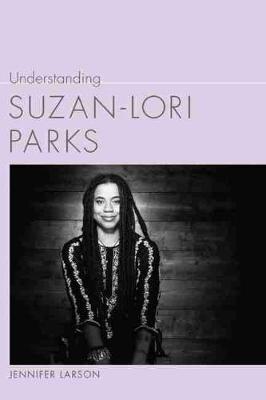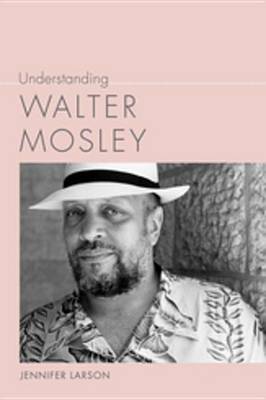Understanding Contemporary American Literature
2 total works
Exploration and analysis of the innovative screenplays and novels by an award-winning playwright. Understanding Suzan-Lori Parks is a critical study of a playwright and screenwriter who was the first African American woman to receive the Pulitzer Prize for Drama. Suzan-Lori Parks is also the recipient of a MacArthur Genius Award, a Whiting Writers Award, a CalArts/Alpert Award in the Arts, two Obie Awards, and a Eugene McDermott Award in the Arts. In this book Jennifer Larson examines how Parks, through the innovative language and narratives of her extensive body of work, investigates and invigorates literary and cultural history.
Larson discusses all of Parks's genres-play, screenplay, essay, and novel-closely reading key texts from Parks's more experimental earlier pieces as well as her more linear later narratives. Larson's study begins with a survey of Parks's earliest and most difficult texts including Imperceptible Mutabilities in the Third Kingdom and The Death of the Last Black Man in the Whole Entire World. Larson then analyses Venus, In the Blood, and the Lincoln Plays: The America Play and the Pulitzer Prize-winning TopDog/Underdog.
Larson also discusses two of Parks's most important screenplays, Girl 6 and Their Eyes Were Watching God. In interpreting these screenplays, Larson examines film's role in the popularisation and representation of African American culture and history. These essays suggest an approach to all genres of literature and blend creativity, form, culture, and history into a revisionary aesthetic that allows for no identity or history to remain fixed, with Parks arguing that in order to be relevant they must all be dynamic and democratic.
Larson discusses all of Parks's genres-play, screenplay, essay, and novel-closely reading key texts from Parks's more experimental earlier pieces as well as her more linear later narratives. Larson's study begins with a survey of Parks's earliest and most difficult texts including Imperceptible Mutabilities in the Third Kingdom and The Death of the Last Black Man in the Whole Entire World. Larson then analyses Venus, In the Blood, and the Lincoln Plays: The America Play and the Pulitzer Prize-winning TopDog/Underdog.
Larson also discusses two of Parks's most important screenplays, Girl 6 and Their Eyes Were Watching God. In interpreting these screenplays, Larson examines film's role in the popularisation and representation of African American culture and history. These essays suggest an approach to all genres of literature and blend creativity, form, culture, and history into a revisionary aesthetic that allows for no identity or history to remain fixed, with Parks arguing that in order to be relevant they must all be dynamic and democratic.
Walter Mosley is perhaps best known for his first published mystery, Devil in a Blue Dress, which became the basis for the 1995 movie of the same name featuring Denzel Washington. Mosley has since written more than forty books across an impressive expanse of genres including, but not limited to, nonfiction, science fiction, drama, and even young adult fiction, garnering him many honors including an O'Henry Award, an Anisfield-Wolf Book Award, a Grammy Award, a Pen Center Lifetime Achievement Award, and two NAACP Image Awards for Outstanding Literary Work in Fiction. In Understanding Walter Mosley, Jennifer Larson considers Mosley's corpus as a whole to help readers more fully understand the evolution of his literary agenda.
All Mosley's texts feature his trademark accessibility as well as his penchant for creating narratives that both entertain and instruct. Larson examines how Mosley's writing interrogates, complicates, and contextualizes recurring moral, social, and even personal questions. She also considers the possible roots of Mosley's enduring popularity with a diverse group of readers. Larson then traces key themes and claims throughout the Easy Rawlins series to show how Mosley's beloved hero offers unique perspectives on race, class, and masculinity in the mid- to late twentieth century; explores the ways in which Fearless Jones, Mosley's second detective, both builds on and diverges from his predecessor's character; and looks at how the works featuring Leonid McGill, Mosley's junior detective, center on understanding the complex relationship between present-day social dilemmas and the personal as well as the communal past.
Regarding Mosley's other genres, Larson argues that the science fiction works together portray a future in which race, class, and gender are completely reimagined, yet still subject to an oppressive power dynamic, while his erotica asks readers to reconsider the dynamics of power and control but in a more personal, even intimate, context. Similarly, in Mosley's nongenre fiction, stories are revived through a reconnection with the past, a reclaiming of cultural heritage and lineage, and a rejection of classist visions of power. Finally, Mosley's nonfiction, which persuades his audience to act through writing, humanitarian efforts, or social uprising, offers a mix of lessons aimed at guiding readers through the same questions that inform his fiction writing.
All Mosley's texts feature his trademark accessibility as well as his penchant for creating narratives that both entertain and instruct. Larson examines how Mosley's writing interrogates, complicates, and contextualizes recurring moral, social, and even personal questions. She also considers the possible roots of Mosley's enduring popularity with a diverse group of readers. Larson then traces key themes and claims throughout the Easy Rawlins series to show how Mosley's beloved hero offers unique perspectives on race, class, and masculinity in the mid- to late twentieth century; explores the ways in which Fearless Jones, Mosley's second detective, both builds on and diverges from his predecessor's character; and looks at how the works featuring Leonid McGill, Mosley's junior detective, center on understanding the complex relationship between present-day social dilemmas and the personal as well as the communal past.
Regarding Mosley's other genres, Larson argues that the science fiction works together portray a future in which race, class, and gender are completely reimagined, yet still subject to an oppressive power dynamic, while his erotica asks readers to reconsider the dynamics of power and control but in a more personal, even intimate, context. Similarly, in Mosley's nongenre fiction, stories are revived through a reconnection with the past, a reclaiming of cultural heritage and lineage, and a rejection of classist visions of power. Finally, Mosley's nonfiction, which persuades his audience to act through writing, humanitarian efforts, or social uprising, offers a mix of lessons aimed at guiding readers through the same questions that inform his fiction writing.

